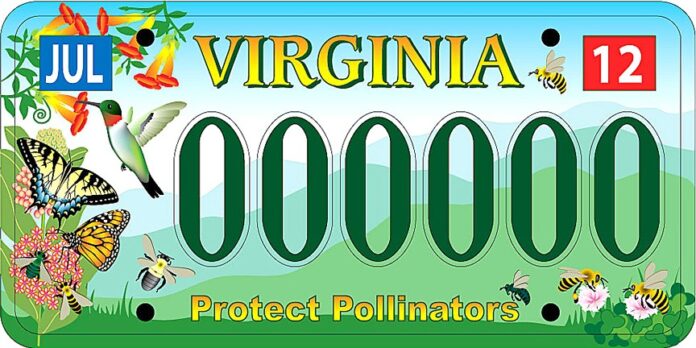
Nature lovers who celebrate pollinators (insects and animals that carry pollen from one plant to another) could soon display their enthusiasm with a “Protect Pollinators” license plate. The plate design features native bees, butterflies, hummingbirds and honeybees, as well as Virginia native plants and the Blue Ridge Mountains.
“So far we’ve had quite a lot of interest from beekeepers, Master Gardeners, Master Naturalists, and Audubon Society members,” said Pollinator Plates developer Samantha Gallagher.
The goal of the plate is to promote a statewide dialog about the conservation of these precious species and the essential role they play in our food supply and ecosystem.
For the plate to become available, Pollinator Plates must meet Virginia’s requirement of collecting 450 completed applications and plate fees by this November. Drivers interested in the Pollinator Plates can visit the official website at www.pollinatorplates.com and complete the application process online or by postal mail. The plates cost $10 annually, or $20 for a personalized plate. Once enough applications are collected, the plates will be introduced into the Virginia General Assembly. After the plates are passed into law, the DMV must approve the design.
Gallagher decided to create a special license plate for pollinators when she moved to Virginia and noticed the wide variety of plates available to drivers. She wanted to highlight the importance of pollinators because of the vital role they play in our food supply and ecosystems. Virginia would be the first state with a Pollinator-themed license plate.
About one-third of the food we eat depends on pollination by a pollinator. Honeybees and native bees (such as bumblebees, orchard mason bees, and sweat bees) are the most efficient at this indispensable process. The decline of honeybees has been widely publicized, but many are not aware that native bees and other pollinators are in decline, too.
Native pollinators are especially important because they’re crucial for our ecosystems to thrive. Wild flowers need to be pollinated to make seeds, which are eaten by birds and small animals, which are then eaten by larger animals, and allow the food chain to sustain.
For more information call 240-298-3570 or email [email protected]. Or visit www.pollinatorplates.com


